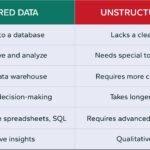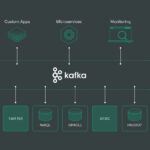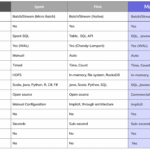In today’s digital age, data has become a valuable asset that organizations can leverage to drive business growth and innovation. Big Data analytics plays a crucial role in extracting insights and patterns from vast amounts of data, enabling companies to make informed decisions and optimize their operations. The future of data monetization with Big Data analytics holds immense potential, as businesses can capitalize on the information gathered to create new revenue streams, improve customer experiences, and gain a competitive edge in the market. With the right tools and strategies in place, organizations can unlock the full potential of their data and drive success in the evolving landscape of data monetization.
In today’s digital landscape, Big Data has emerged as a transformative force, reshaping how businesses operate, make decisions, and interact with customers. As organizations generate and accumulate vast amounts of data, the focus is shifting from simply collecting data to effectively monetizing it through advanced Big Data Analytics. This article explores the future of data monetization, highlighting the trends, technologies, and strategies that organizations can adopt to harness the value of their data assets.
The Rise of Data as an Asset
Data is increasingly seen as a core asset for businesses. Companies that recognize the value of data-driven decision-making are leveraging it to gain a competitive edge. According to industry experts, organizations that incorporate Big Data Analytics into their operations can improve their operational efficiency by up to 30%, ultimately leading to enhanced profitability.
With the proliferation of digital platforms, data collection has never been easier. Businesses can gather insights from various sources, including customer interactions, sales transactions, market trends, and social media. This wealth of information enables companies to create more personalized products and services, opening new avenues for monetization.
Emerging Trends in Data Monetization
The landscape of data monetization is evolving rapidly, driven by several key trends:
1. The Shift Toward Data-Driven Business Models
Organizations are increasingly adopting data-driven business models where data plays a central role in service delivery. Subscription-based services, personalized marketing, and performance-based pricing are examples of how companies can leverage data to generate revenue. By analyzing customer behavior and preferences, businesses can create tailored offerings that resonate with their target audience.
2. Monetizing through Predictive Analytics
Predictive analytics is a powerful tool that uses historical data to forecast future outcomes. Organizations can monetize their data by creating value-added services based on these predictions. For example, retailers can anticipate inventory needs, while financial institutions can assess credit risks more accurately. By offering these analytical services to clients, companies can diversify their revenue streams.
3. Data Sharing and Collaboration
Collaboration between organizations for data sharing has become a prominent trend in data monetization. By partnering with other entities, companies can pool their resources and insights for mutual benefit. The sharing economy encourages businesses to leverage each other’s datasets, enhancing the quality of analytics and driving more informed decisions. However, this trend also highlights the need for robust data governance and privacy measures.
4. The Rise of Data Marketplaces
Data marketplaces are gaining traction as platforms where organizations can buy and sell data. These marketplaces facilitate the exchange of data assets, enabling businesses to monetize surplus data that may not align with their primary objectives. By participating in these platforms, companies can access diverse datasets while generating revenue from their own data.
Technologies Shaping Data Monetization
The future of data monetization is heavily influenced by several emerging technologies:
1. Machine Learning and Artificial Intelligence
Machine learning and artificial intelligence (AI) are at the forefront of advancing data analytics capabilities. These technologies can process massive datasets quickly and efficiently, providing organizations with insights that drive better decision-making. By implementing AI-driven analytics, companies can automate processes and enhance their market offerings, thereby boosting monetization opportunities.
2. Blockchain Technology
Blockchain technology offers a secure and transparent framework for data transactions, making it an excellent tool for data monetization. By using blockchain, businesses can ensure the integrity and ownership of data assets, alleviating concerns around data privacy and security. This technology also enables micropayments, allowing businesses to monetize their data in real time without the need for intermediaries.
3. Edge Computing
With the rapid increase in IoT devices, edge computing is becoming crucial for processing data closer to the source. This approach minimizes latency and enhances real-time analytics, thereby improving customer experiences. Companies can monetize data generated by IoT devices in various sectors, including healthcare, manufacturing, and smart cities.
Strategies for Successful Data Monetization
To successfully monetize data, organizations should consider implementing the following strategies:
1. Develop a Data Monetization Strategy
Creating a comprehensive data monetization strategy is essential for success. This strategy should encompass identifying valuable datasets, understanding target markets, and determining feasible monetization methods. Companies should also evaluate potential risks and compliance issues to ensure they are adhering to relevant regulations.
2. Invest in Data Quality and Governance
High-quality data is the cornerstone of effective Big Data Analytics. Organizations should prioritize data governance, including data cleaning, normalization, and validation processes. By ensuring that the data is accurate, complete, and up-to-date, businesses can unlock its true potential and capitalize on monetization opportunities.
3. Foster a Data-Driven Culture
Encouraging a data-driven culture within the organization is essential for successful data monetization. This involves promoting data literacy among employees and providing access to analytics tools and resources. By empowering teams to utilize data in their decision-making processes, companies can foster innovation and drive revenue growth.
4. Emphasize Customer Privacy and Security
As organizations look to monetize data, they must prioritize customer privacy and data security. Implementing robust security measures and transparent data handling practices is crucial to gaining customer trust. Companies should also comply with data protection regulations and provide customers with options to control their data sharing preferences.
The Ethical Considerations of Data Monetization
As the pursuit of data monetization accelerates, ethical considerations must be at the forefront of any strategy. Organizations should address the following:
1. Transparency in Data Usage
Businesses should maintain transparency regarding how customer data is used and monetized. Clear communication about data practices builds trust with consumers and fosters long-term relationships.
2. Compliance with Regulations
Adhering to data protection regulations such as GDPR and CCPA is non-negotiable. Companies must ensure that their data monetization practices align with legal requirements, particularly when it comes to user consent and data protection.
3. Balancing Value and Privacy
Finding the right balance between generating value from data and protecting customer privacy is critical. Organizations should seek innovative ways to monetize data without compromising customer trust or violating privacy regulations.
Conclusion
The future of data monetization through Big Data Analytics holds immense potential. As businesses navigate this evolving landscape, those that embrace emerging technologies, prioritize data quality, and foster a strong ethical framework will be best positioned to thrive. By transforming data into actionable insights, organizations can unlock new revenue streams and enhance their overall competitive advantage.
The future of data monetization through Big Data analytics holds immense potential for businesses to extract valuable insights, improve decision-making, and drive innovation. As organizations continue to leverage the power of Big Data, they will be better equipped to capitalize on new revenue streams, enhance customer experiences, and stay competitive in a rapidly evolving digital landscape. Embracing data monetization strategies with the help of Big Data analytics will undoubtedly pave the way for unprecedented growth and success in the years to come.














